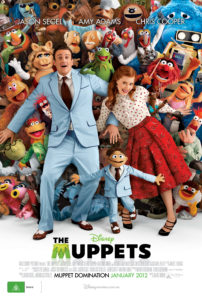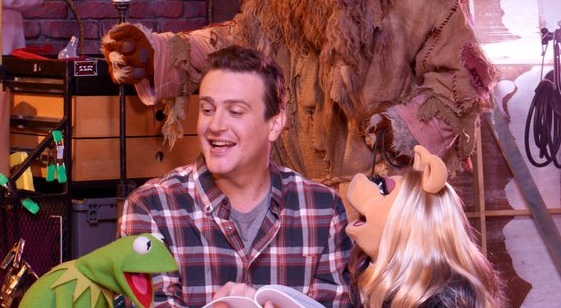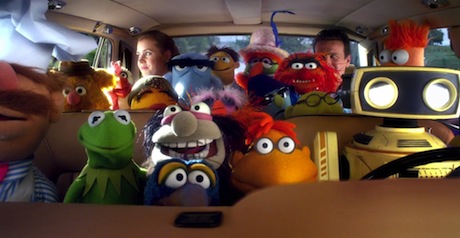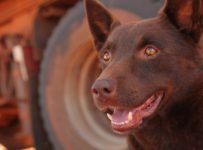 Absent from our cinemas screens for over 12 years, The Muppets have returned to us in one of their most smile-inducing outings ever thanks to writer/star Jason Segel, his co-writer Nicholas Stoller and director James Bobbin. Thanks to Disney, we got a chance to chat with Mr. Segel during his recent trip to Sydney.
Absent from our cinemas screens for over 12 years, The Muppets have returned to us in one of their most smile-inducing outings ever thanks to writer/star Jason Segel, his co-writer Nicholas Stoller and director James Bobbin. Thanks to Disney, we got a chance to chat with Mr. Segel during his recent trip to Sydney.
When the interview began, Jason Segel immediately asked me if I would like to chat over coffee, or if I would prefer to hop into the bed with him. It is one of those offers that doesn’t come around very often, but it certainly set the tone for the rest of the chat, as you’ll hear.
In The Muppets, Walter, the world’s biggest Muppet fan, and friends Gary (Jason Segel) and Mary (Amy Adams) discover the nefarious plan of oilman Tex Richman (Chris Cooper) to raze the Muppet Theatre, they help Kermit reunite the Muppets to stage The Greatest Muppet Telethon Ever and raise the $10 million needed to save the theatre.
We need to thank Disney for this terrific opportunity, and of course Mr. Segel for his time and generous discussion. You can listen to the interview via the links above, or read a full transcript below.
The Muppets was released on 23 November 2011 in the US and on 5 January 2012 in Australia from Disney.
RG: You’re probably going to hear this all day, but this is not what a Sydney summer is normally like.
JS: I know. It’s what I keep hearing, but it’s all I’ve seen, it’s all I know.
RG: So welcome to Australia…
JS: Thank you very much.
RG: And congratulations on the success of The Muppets.
JS: Thanks!
RG: And can I just say on a personal note, that I don’t think I’ve walked out of a film with a bigger smile on my face for a long time.
JS: Oh, good. That’s what we were going for.
RG: So my understanding is that you approached Disney with Nick Stoller.
JS: I did.
RG: So what was it I guess, what was the seed that drove the passion for The Muppets?
JS: Well, I’d been passionate about the Muppets since I was a kid, but I guess what got this process started was the end of [Forgetting] Sarah Marshall, we had that lavish Dracula puppet musical, and the Henson company designed those puppets. And so it was working with the Henson company and being around those puppeteers and reminding myself how much I loved puppetry that sort of lit the fire under me to try and bring the Muppets back to the big screen.
RG: You introduce a new character. Was there an enormous amount of pressure introducing something new into that world? Did you feel as though you were tampering with the myth?
JS: No, because I kind of felt like that character was necessary. He’s the eyes and the ears of the audience. And he’s sort of an analogue for the experience Nick and I had. He’s a wide-eyed innocent who just love the Muppets, he’s the biggest Muppets fan in the world. When he finds the Muppets, they’re in a state of disrepair to some extent, and feels the need to get the Muppets back together and put on a big show to remind people how great the Muppets are. It literally is what Nick and I were doing in real life. So we felt like that was an appropriate character to have as sort of serve as the vehicle to tell the story.
RG: One of the other things that is fantastic about the film, and I have to admit to having the soundtrack on high rotation…
JS: Oh nice!
RG: The music. So you’ve obviously had experience with Forgetting Sarah Marashall and Get Him to the Greek, you’d written music before. With this one, writing with Brett McKenzie, which is fantastic (Flight of the Conchords)…
JS: Yeah, amazing…
RG: When you’re writing the script, did you have and idea of the types of songs you had in mind from the start?
JS: Yeah, and the way we wrote the songs was though, in our script, they were just placeholders. We actually, for “Life’s A Happy Song”, we didn’t write any music or even lyrics. What we would write was big block descriptions of text like ‘They begin to sing a song about how everything is great, but subtextually we see that everything is not great. They march out onto Main Street, people start falling behind them, a circus arrives’. You know, so we wrote in very broad general terms, and we let Brett McKenzie take it from there as a blueprint, and he completed the painting.
RG: So did you have particular influences, when you were writing those big musical numbers, were there particular things you envisaged?
JS: Well there are the big musical numbers from the original Muppet movies that really got us. The opening number of Great Muppet Caper, “It’s a Movie” I think it’s called, or “Hey A Movie”. It’s a great song the whole town sings, so that was definitely on our mind. You know, and “Manhattan Melodies” from The Muppets Take Manhattan is a lavish musical, so those things. Also, I was really influenced by things like Singin’ in The Rain, the old MGM-style musical numbers, I’ve always wanted to take part in those. Donald O’Connor, “Make ‘Em Laugh”…
RG: Favourite scene ever.
JS: It’s amazing. It’s truly amazing. And so, those were always in my mind too.
RG: Is there a divide between what you write and technically having to pull that off with the Muppets?
JS: Yeah, when you’re writing you sort of try and be unbridled in terms of your imagination. Then you realise that you’re going to have to film this with inanimate puppets and puppeteers everywhere, and the logistics of that became a bit overwhelming. We had a scene where ten, we pictured ten – where Gonzo blows up the building – ten full figured Muppets running in slow-motions away from a building that’s exploding behind them. Then we were asked by the guy who arranges the puppet choreography ‘Well, do you have any idea on how you were planning on doing this?’, and we said “No”. And he said that this is almost impossible to do. [Laughs]. So instead of cutting scenes like that, we tried to hang a lantern on that they were impossible. So instead we have that shot from in front of them, of just puppet heads bouncing, running theoretically, and you hear the explosion off screen. And Fozzie just says “What an expensive looking explosion”. So that’s how we handled the logistic problems.
RG: Or is it just because Muppet legs look weird?
JS: And there’s puppeteers who have to operate. So for every puppet that’s running, there’s four puppeteers. One for each leg, one for an arm and the other for an arm and the head. So if you’re going to have ten Muppets running away from something, that’s forty puppeteers all in a confined space in one wide shot, that’s pretty impossible.
RG: Without ruining my childhood memories any further, when you’re acting alongside puppets and puppeteers, is it difficult to do that? Is it easy to forget the puppeteers are there or is it a constant thing…
JS: These guys are such amazing puppeteers. They’re at the top of the game in that world. These are the Muppeteers. It doesn’t get more prestigious than that. So, no – it doesn’t take more than two minutes of talking to Kermit before you’re looking at Kermit, you know, right in the eyes. Even as a grown man, that’s just what happens.
RG: Reteaming with Nicholas Stoller, who you’re working with again on Five Year Engagement next. That relationship now, do the ideas flow thick and fast now…
JS: Yeah, we share a comedy brain to some extent. But I think what’s best about our relationship our Venn diagram of taste largely intersects to the point that I’ve never dealt with anyone that it was that big a chunk. Maybe the most important parts are the slivers where they don’t intersect, and that’s where we really benefit each other. We have different experience in that he’s been a comedy writer for a long time, and he’s also a director so he understands logistics and structure in a way that I don’t, and I’ve been acting for a long time, as long as he’s been writing. So I am able to look at scenes and dialogue in a way of someone who actually has to say it. While jokes might be really funny on the page, I’ll be able to say ‘Yeah, but that’s not how a person actually talks’. It’s how a comedian talks, or it might be how you read something funny but it’s not how a person talks. Then he might say ‘That’s too sappy, that’s just because you like acting’. That’s not funny enough, you know what I mean. [Laughs] So we have, it’s our differences that really help us I think.
RG: So just on that, bringing that kind of naturalistic comedy into The Muppets world. Was there a conflict, because your comedies prior to that had been very different to what we see in The Muppets. Was there resistance from Disney at all?
JS: It doesn’t take long in talking to me about the Muppets before you realise I’m sincere in talking about it, you know? I think initially their nervousness was that I was doing this for some sense of irony, or that I was going to try and modernise the Muppets. It takes like a ten-minute Muppets session to realise ‘Oh no, he loves the Muppets’. That was really all it took. It was a little bit longer with the old guard, because I had just done a movie where I did full-frontal nudity, and they’ve been doing this for thirty, forty years some of them. But again, as soon as they saw the movie, I think they realised it was a total love-letter to the Muppets.
RG: And Kermit’s never worn pants either…
JS: Exactly, absolutely! [Laughs]
RG: I guess the other relationship you’ve had for a long time is with Judd Apatow, and you’ve got This Is Forty coming up. So what’s it like returning to a character you created so many years ago? Is it an expanded role?
JS: No, that is really truly a cameo. So that made it very easy. It was strictly fun. With a role like that, your job is just to come in and be funny. Which is nice. It’s zero pressure. You’re not trying to carry the movie, you’re not trying to forward the plot even. It’s just go in and be funny. So those were really fun days.
RG: And with the success of The Muppets, is there a possibility of returning to the Muppet fray, or are you happy you’ve just brought it back into the world?
JS: Well that was my goal, and my goal was to set the stage for the Muppets to do whatever they want. So I would love to see the Muppets doing movies, and TV shows and all that, but my feeling is that I serve at the pleasure of Kermit.
RG: I think we all do. The last thing I wanted to ask you, was that I noticed you’re a recent convert to the social network of Twitter…
JS: Yeah, I’m the best Twittterer of all time.
RG: You are. Does that change – I don’t know what to say to that – [Laughs] Do you find that changes the way you relate to the fanosphere, and the fans relate to you? Is it a more direct line?
JS: I don’t know if you’ve noticed, but most of my tweets are about food. They’re food related. I find myself eating along a lot of the time, so it’s really nice for me to be able to feel like I have company at dinner, because I just tweet what I’m eating, and I get responses. Last night, I tweeted my favourite bread and cheese dishes, I tweeted my top 5 favourite sandwiches. We had a really heavy sandwich versus burrito debate. These are the kind of things I feel like the world wants to know.
RG: And I saw you celebrated half a million followers, so clearly the world does want to…
JS: I did. That’s the most followers of anyone on Twitter.
RG: I’ll go with that. Yup.
JS: [Laughs] Ok.
RG: It’s funny. What is it? Facebook is where you lie to your friends, and Twitter is where you’re perfectly honest to strangers.
JS: [Laughs] That’s funny. That’s really funny.
RG: Thank you so much for your time.
JS: Thanks, man. That was so fun.






Well done Reel Bits…great great interview! This is so far the best of the Muppets tour in oz, after the most horrible red carpet we ever seen.
10/10
Thanks! It was so much fun to do, and my only regret is that I didn’t get to meet Kermit himself.
Is it just me, or is it a tad creepy that Jason Segel has such an emotional relationship with a sock?
Hey, as the man says, we ALL serve at the pleasure of Kermit.
Who’s he supposed to have a relationship with? You? Rumor has it, you’re texture is even rougher to rub against.